Comparative Analysis: Feminism & Postcolonial Themes in Literature
VerifiedAdded on 2023/06/11
|9
|3625
|201
Essay
AI Summary
This essay critically discusses the crosscurrents between postcolonial studies and feminism by comparing Arundhati Roy's "The God of Small Things" and Salman Rushdie's "Shame." It focuses on the portrayal of feminism, the voices of female characters, and the stance of feminism in postcolonial contexts. The analysis emphasizes the use of third-world feminism, the objectification of women, and the freedoms held by female characters in both novels. The essay argues that the novels do not display crosscurrents between postcolonialism and feminism but rather an agreement to work together, highlighting the subtle and apparent feminist voices in each novel.
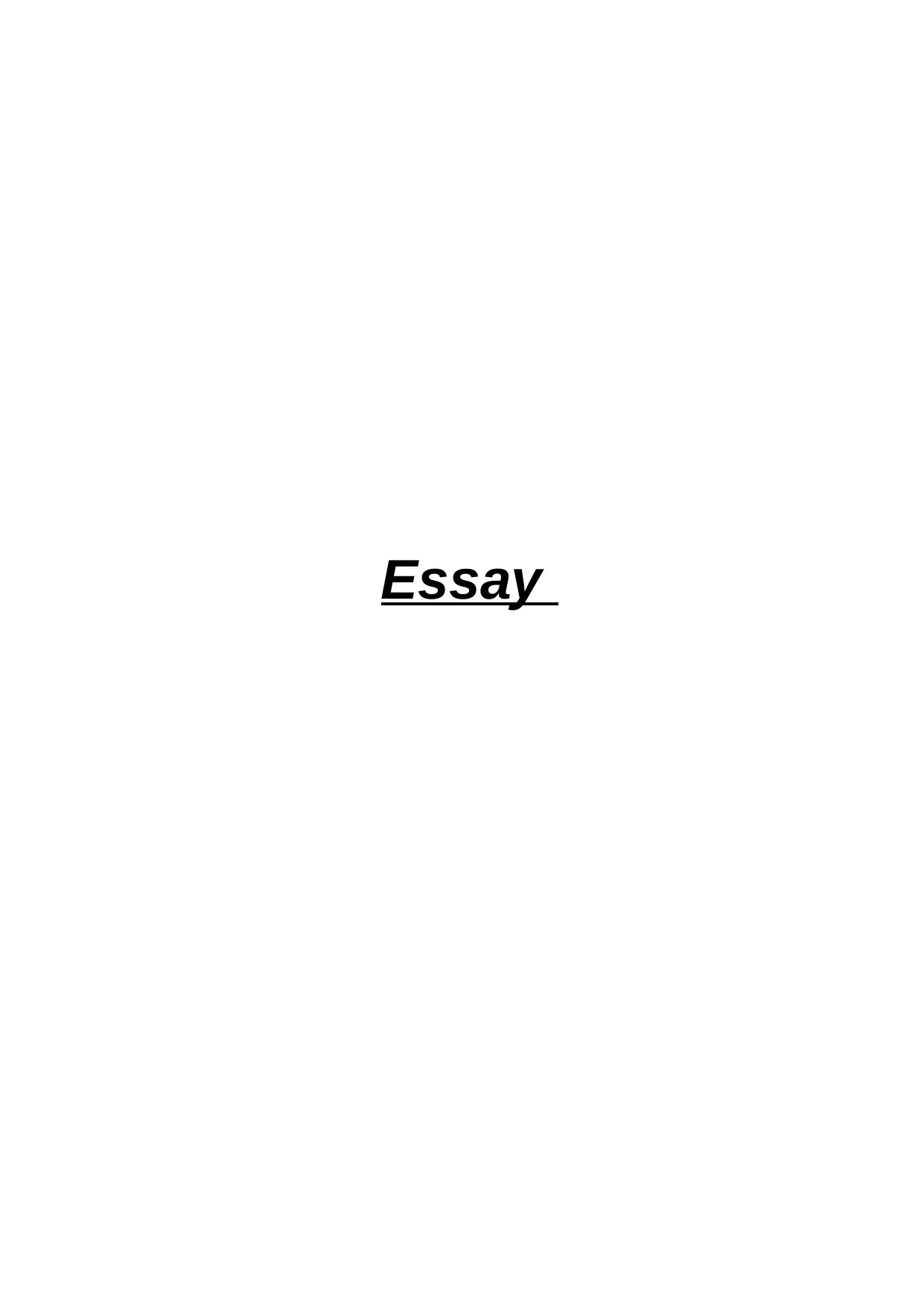
Essay
Paraphrase This Document
Need a fresh take? Get an instant paraphrase of this document with our AI Paraphraser
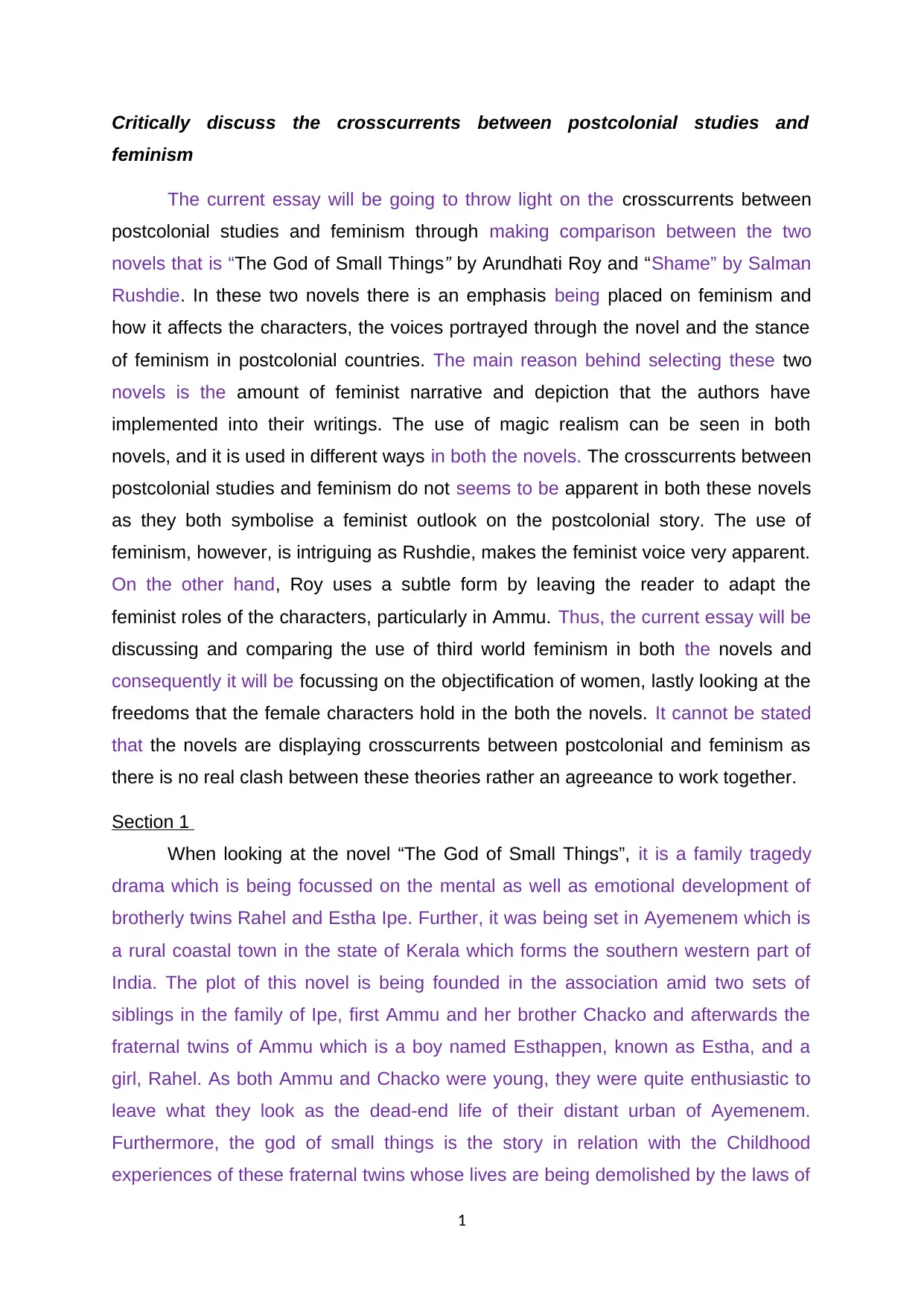
Critically discuss the crosscurrents between postcolonial studies and
feminism
The current essay will be going to throw light on the crosscurrents between
postcolonial studies and feminism through making comparison between the two
novels that is “The God of Small Things” by Arundhati Roy and “Shame” by Salman
Rushdie. In these two novels there is an emphasis being placed on feminism and
how it affects the characters, the voices portrayed through the novel and the stance
of feminism in postcolonial countries. The main reason behind selecting these two
novels is the amount of feminist narrative and depiction that the authors have
implemented into their writings. The use of magic realism can be seen in both
novels, and it is used in different ways in both the novels. The crosscurrents between
postcolonial studies and feminism do not seems to be apparent in both these novels
as they both symbolise a feminist outlook on the postcolonial story. The use of
feminism, however, is intriguing as Rushdie, makes the feminist voice very apparent.
On the other hand, Roy uses a subtle form by leaving the reader to adapt the
feminist roles of the characters, particularly in Ammu. Thus, the current essay will be
discussing and comparing the use of third world feminism in both the novels and
consequently it will be focussing on the objectification of women, lastly looking at the
freedoms that the female characters hold in the both the novels. It cannot be stated
that the novels are displaying crosscurrents between postcolonial and feminism as
there is no real clash between these theories rather an agreeance to work together.
Section 1
When looking at the novel “The God of Small Things”, it is a family tragedy
drama which is being focussed on the mental as well as emotional development of
brotherly twins Rahel and Estha Ipe. Further, it was being set in Ayemenem which is
a rural coastal town in the state of Kerala which forms the southern western part of
India. The plot of this novel is being founded in the association amid two sets of
siblings in the family of Ipe, first Ammu and her brother Chacko and afterwards the
fraternal twins of Ammu which is a boy named Esthappen, known as Estha, and a
girl, Rahel. As both Ammu and Chacko were young, they were quite enthusiastic to
leave what they look as the dead-end life of their distant urban of Ayemenem.
Furthermore, the god of small things is the story in relation with the Childhood
experiences of these fraternal twins whose lives are being demolished by the laws of
1
feminism
The current essay will be going to throw light on the crosscurrents between
postcolonial studies and feminism through making comparison between the two
novels that is “The God of Small Things” by Arundhati Roy and “Shame” by Salman
Rushdie. In these two novels there is an emphasis being placed on feminism and
how it affects the characters, the voices portrayed through the novel and the stance
of feminism in postcolonial countries. The main reason behind selecting these two
novels is the amount of feminist narrative and depiction that the authors have
implemented into their writings. The use of magic realism can be seen in both
novels, and it is used in different ways in both the novels. The crosscurrents between
postcolonial studies and feminism do not seems to be apparent in both these novels
as they both symbolise a feminist outlook on the postcolonial story. The use of
feminism, however, is intriguing as Rushdie, makes the feminist voice very apparent.
On the other hand, Roy uses a subtle form by leaving the reader to adapt the
feminist roles of the characters, particularly in Ammu. Thus, the current essay will be
discussing and comparing the use of third world feminism in both the novels and
consequently it will be focussing on the objectification of women, lastly looking at the
freedoms that the female characters hold in the both the novels. It cannot be stated
that the novels are displaying crosscurrents between postcolonial and feminism as
there is no real clash between these theories rather an agreeance to work together.
Section 1
When looking at the novel “The God of Small Things”, it is a family tragedy
drama which is being focussed on the mental as well as emotional development of
brotherly twins Rahel and Estha Ipe. Further, it was being set in Ayemenem which is
a rural coastal town in the state of Kerala which forms the southern western part of
India. The plot of this novel is being founded in the association amid two sets of
siblings in the family of Ipe, first Ammu and her brother Chacko and afterwards the
fraternal twins of Ammu which is a boy named Esthappen, known as Estha, and a
girl, Rahel. As both Ammu and Chacko were young, they were quite enthusiastic to
leave what they look as the dead-end life of their distant urban of Ayemenem.
Furthermore, the god of small things is the story in relation with the Childhood
experiences of these fraternal twins whose lives are being demolished by the laws of
1
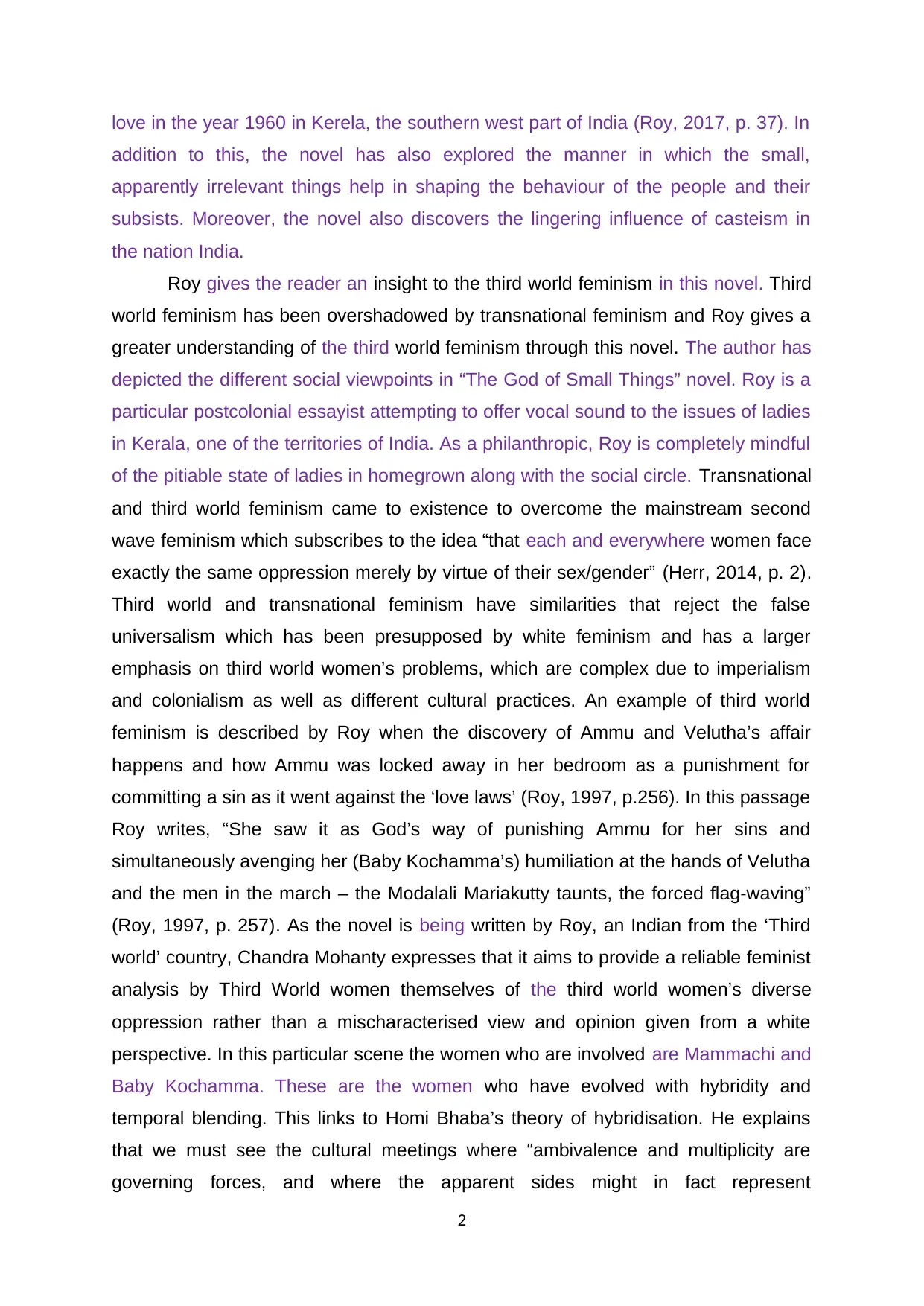
love in the year 1960 in Kerela, the southern west part of India (Roy, 2017, p. 37). In
addition to this, the novel has also explored the manner in which the small,
apparently irrelevant things help in shaping the behaviour of the people and their
subsists. Moreover, the novel also discovers the lingering influence of casteism in
the nation India.
Roy gives the reader an insight to the third world feminism in this novel. Third
world feminism has been overshadowed by transnational feminism and Roy gives a
greater understanding of the third world feminism through this novel. The author has
depicted the different social viewpoints in “The God of Small Things” novel. Roy is a
particular postcolonial essayist attempting to offer vocal sound to the issues of ladies
in Kerala, one of the territories of India. As a philanthropic, Roy is completely mindful
of the pitiable state of ladies in homegrown along with the social circle. Transnational
and third world feminism came to existence to overcome the mainstream second
wave feminism which subscribes to the idea “that each and everywhere women face
exactly the same oppression merely by virtue of their sex/gender” (Herr, 2014, p. 2).
Third world and transnational feminism have similarities that reject the false
universalism which has been presupposed by white feminism and has a larger
emphasis on third world women’s problems, which are complex due to imperialism
and colonialism as well as different cultural practices. An example of third world
feminism is described by Roy when the discovery of Ammu and Velutha’s affair
happens and how Ammu was locked away in her bedroom as a punishment for
committing a sin as it went against the ‘love laws’ (Roy, 1997, p.256). In this passage
Roy writes, “She saw it as God’s way of punishing Ammu for her sins and
simultaneously avenging her (Baby Kochamma’s) humiliation at the hands of Velutha
and the men in the march – the Modalali Mariakutty taunts, the forced flag-waving”
(Roy, 1997, p. 257). As the novel is being written by Roy, an Indian from the ‘Third
world’ country, Chandra Mohanty expresses that it aims to provide a reliable feminist
analysis by Third World women themselves of the third world women’s diverse
oppression rather than a mischaracterised view and opinion given from a white
perspective. In this particular scene the women who are involved are Mammachi and
Baby Kochamma. These are the women who have evolved with hybridity and
temporal blending. This links to Homi Bhaba’s theory of hybridisation. He explains
that we must see the cultural meetings where “ambivalence and multiplicity are
governing forces, and where the apparent sides might in fact represent
2
addition to this, the novel has also explored the manner in which the small,
apparently irrelevant things help in shaping the behaviour of the people and their
subsists. Moreover, the novel also discovers the lingering influence of casteism in
the nation India.
Roy gives the reader an insight to the third world feminism in this novel. Third
world feminism has been overshadowed by transnational feminism and Roy gives a
greater understanding of the third world feminism through this novel. The author has
depicted the different social viewpoints in “The God of Small Things” novel. Roy is a
particular postcolonial essayist attempting to offer vocal sound to the issues of ladies
in Kerala, one of the territories of India. As a philanthropic, Roy is completely mindful
of the pitiable state of ladies in homegrown along with the social circle. Transnational
and third world feminism came to existence to overcome the mainstream second
wave feminism which subscribes to the idea “that each and everywhere women face
exactly the same oppression merely by virtue of their sex/gender” (Herr, 2014, p. 2).
Third world and transnational feminism have similarities that reject the false
universalism which has been presupposed by white feminism and has a larger
emphasis on third world women’s problems, which are complex due to imperialism
and colonialism as well as different cultural practices. An example of third world
feminism is described by Roy when the discovery of Ammu and Velutha’s affair
happens and how Ammu was locked away in her bedroom as a punishment for
committing a sin as it went against the ‘love laws’ (Roy, 1997, p.256). In this passage
Roy writes, “She saw it as God’s way of punishing Ammu for her sins and
simultaneously avenging her (Baby Kochamma’s) humiliation at the hands of Velutha
and the men in the march – the Modalali Mariakutty taunts, the forced flag-waving”
(Roy, 1997, p. 257). As the novel is being written by Roy, an Indian from the ‘Third
world’ country, Chandra Mohanty expresses that it aims to provide a reliable feminist
analysis by Third World women themselves of the third world women’s diverse
oppression rather than a mischaracterised view and opinion given from a white
perspective. In this particular scene the women who are involved are Mammachi and
Baby Kochamma. These are the women who have evolved with hybridity and
temporal blending. This links to Homi Bhaba’s theory of hybridisation. He explains
that we must see the cultural meetings where “ambivalence and multiplicity are
governing forces, and where the apparent sides might in fact represent
2
⊘ This is a preview!⊘
Do you want full access?
Subscribe today to unlock all pages.

Trusted by 1+ million students worldwide
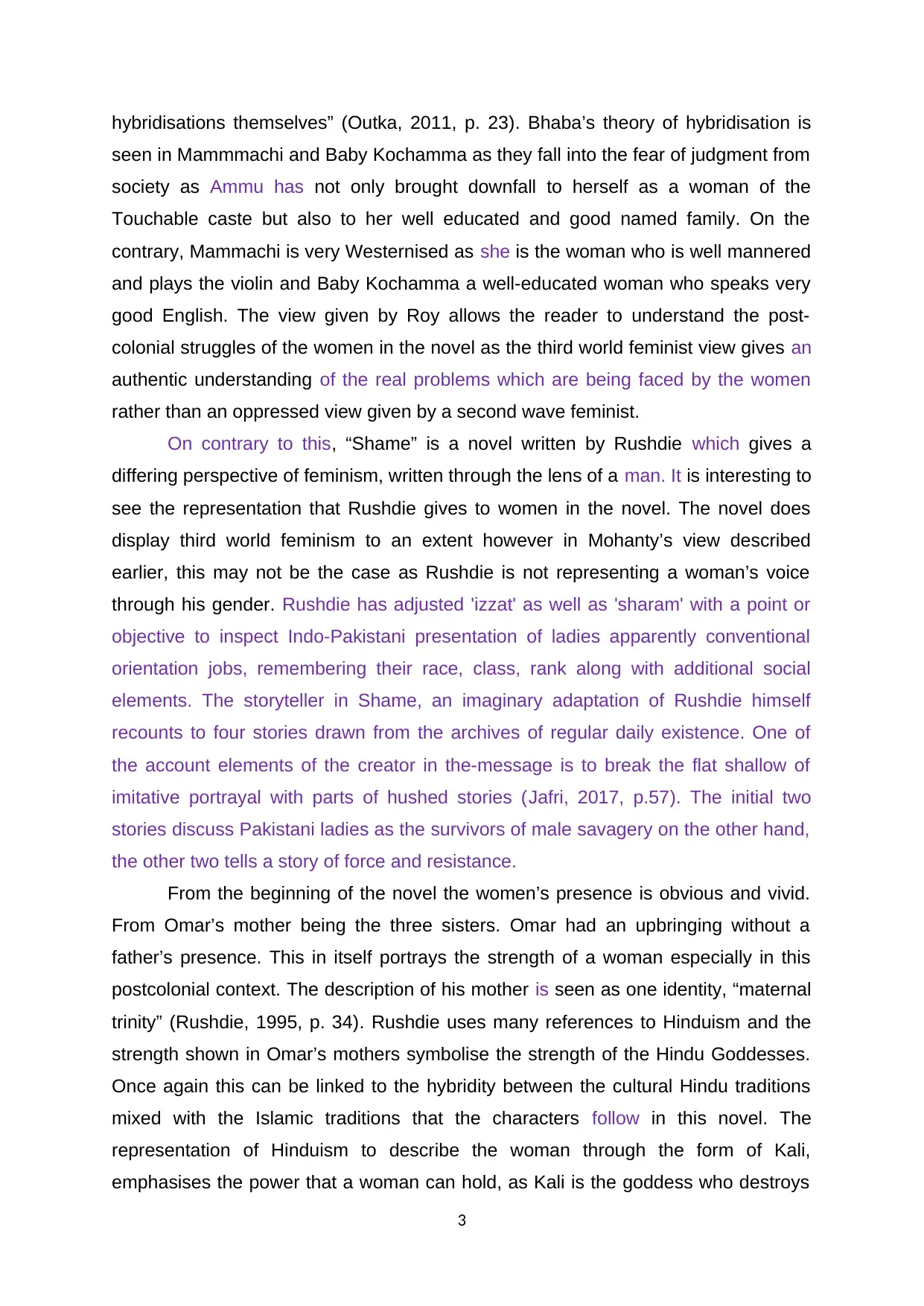
hybridisations themselves” (Outka, 2011, p. 23). Bhaba’s theory of hybridisation is
seen in Mammmachi and Baby Kochamma as they fall into the fear of judgment from
society as Ammu has not only brought downfall to herself as a woman of the
Touchable caste but also to her well educated and good named family. On the
contrary, Mammachi is very Westernised as she is the woman who is well mannered
and plays the violin and Baby Kochamma a well-educated woman who speaks very
good English. The view given by Roy allows the reader to understand the post-
colonial struggles of the women in the novel as the third world feminist view gives an
authentic understanding of the real problems which are being faced by the women
rather than an oppressed view given by a second wave feminist.
On contrary to this, “Shame” is a novel written by Rushdie which gives a
differing perspective of feminism, written through the lens of a man. It is interesting to
see the representation that Rushdie gives to women in the novel. The novel does
display third world feminism to an extent however in Mohanty’s view described
earlier, this may not be the case as Rushdie is not representing a woman’s voice
through his gender. Rushdie has adjusted 'izzat' as well as 'sharam' with a point or
objective to inspect Indo-Pakistani presentation of ladies apparently conventional
orientation jobs, remembering their race, class, rank along with additional social
elements. The storyteller in Shame, an imaginary adaptation of Rushdie himself
recounts to four stories drawn from the archives of regular daily existence. One of
the account elements of the creator in the-message is to break the flat shallow of
imitative portrayal with parts of hushed stories (Jafri, 2017, p.57). The initial two
stories discuss Pakistani ladies as the survivors of male savagery on the other hand,
the other two tells a story of force and resistance.
From the beginning of the novel the women’s presence is obvious and vivid.
From Omar’s mother being the three sisters. Omar had an upbringing without a
father’s presence. This in itself portrays the strength of a woman especially in this
postcolonial context. The description of his mother is seen as one identity, “maternal
trinity” (Rushdie, 1995, p. 34). Rushdie uses many references to Hinduism and the
strength shown in Omar’s mothers symbolise the strength of the Hindu Goddesses.
Once again this can be linked to the hybridity between the cultural Hindu traditions
mixed with the Islamic traditions that the characters follow in this novel. The
representation of Hinduism to describe the woman through the form of Kali,
emphasises the power that a woman can hold, as Kali is the goddess who destroys
3
seen in Mammmachi and Baby Kochamma as they fall into the fear of judgment from
society as Ammu has not only brought downfall to herself as a woman of the
Touchable caste but also to her well educated and good named family. On the
contrary, Mammachi is very Westernised as she is the woman who is well mannered
and plays the violin and Baby Kochamma a well-educated woman who speaks very
good English. The view given by Roy allows the reader to understand the post-
colonial struggles of the women in the novel as the third world feminist view gives an
authentic understanding of the real problems which are being faced by the women
rather than an oppressed view given by a second wave feminist.
On contrary to this, “Shame” is a novel written by Rushdie which gives a
differing perspective of feminism, written through the lens of a man. It is interesting to
see the representation that Rushdie gives to women in the novel. The novel does
display third world feminism to an extent however in Mohanty’s view described
earlier, this may not be the case as Rushdie is not representing a woman’s voice
through his gender. Rushdie has adjusted 'izzat' as well as 'sharam' with a point or
objective to inspect Indo-Pakistani presentation of ladies apparently conventional
orientation jobs, remembering their race, class, rank along with additional social
elements. The storyteller in Shame, an imaginary adaptation of Rushdie himself
recounts to four stories drawn from the archives of regular daily existence. One of
the account elements of the creator in the-message is to break the flat shallow of
imitative portrayal with parts of hushed stories (Jafri, 2017, p.57). The initial two
stories discuss Pakistani ladies as the survivors of male savagery on the other hand,
the other two tells a story of force and resistance.
From the beginning of the novel the women’s presence is obvious and vivid.
From Omar’s mother being the three sisters. Omar had an upbringing without a
father’s presence. This in itself portrays the strength of a woman especially in this
postcolonial context. The description of his mother is seen as one identity, “maternal
trinity” (Rushdie, 1995, p. 34). Rushdie uses many references to Hinduism and the
strength shown in Omar’s mothers symbolise the strength of the Hindu Goddesses.
Once again this can be linked to the hybridity between the cultural Hindu traditions
mixed with the Islamic traditions that the characters follow in this novel. The
representation of Hinduism to describe the woman through the form of Kali,
emphasises the power that a woman can hold, as Kali is the goddess who destroys
3
Paraphrase This Document
Need a fresh take? Get an instant paraphrase of this document with our AI Paraphraser
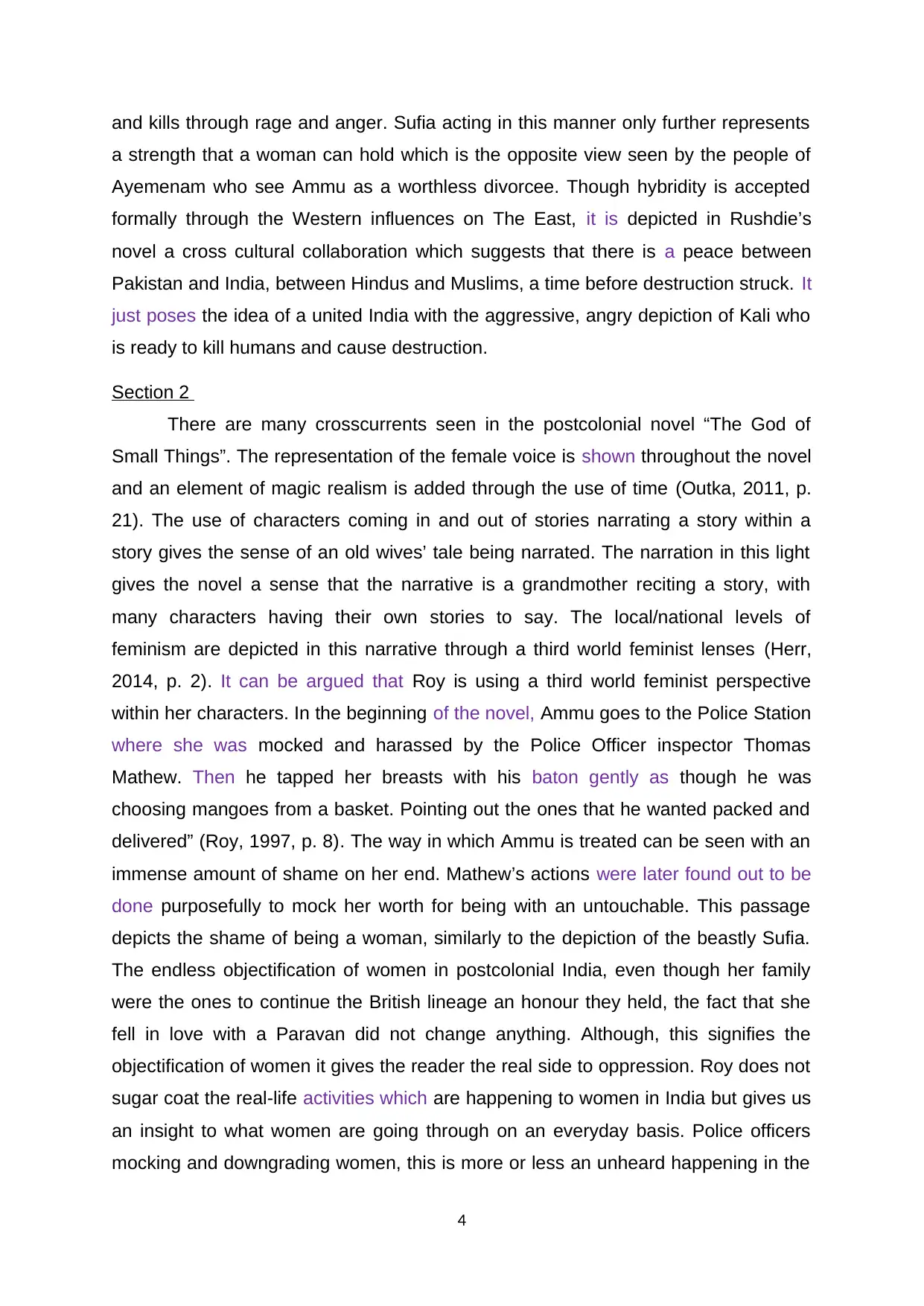
and kills through rage and anger. Sufia acting in this manner only further represents
a strength that a woman can hold which is the opposite view seen by the people of
Ayemenam who see Ammu as a worthless divorcee. Though hybridity is accepted
formally through the Western influences on The East, it is depicted in Rushdie’s
novel a cross cultural collaboration which suggests that there is a peace between
Pakistan and India, between Hindus and Muslims, a time before destruction struck. It
just poses the idea of a united India with the aggressive, angry depiction of Kali who
is ready to kill humans and cause destruction.
Section 2
There are many crosscurrents seen in the postcolonial novel “The God of
Small Things”. The representation of the female voice is shown throughout the novel
and an element of magic realism is added through the use of time (Outka, 2011, p.
21). The use of characters coming in and out of stories narrating a story within a
story gives the sense of an old wives’ tale being narrated. The narration in this light
gives the novel a sense that the narrative is a grandmother reciting a story, with
many characters having their own stories to say. The local/national levels of
feminism are depicted in this narrative through a third world feminist lenses (Herr,
2014, p. 2). It can be argued that Roy is using a third world feminist perspective
within her characters. In the beginning of the novel, Ammu goes to the Police Station
where she was mocked and harassed by the Police Officer inspector Thomas
Mathew. Then he tapped her breasts with his baton gently as though he was
choosing mangoes from a basket. Pointing out the ones that he wanted packed and
delivered” (Roy, 1997, p. 8). The way in which Ammu is treated can be seen with an
immense amount of shame on her end. Mathew’s actions were later found out to be
done purposefully to mock her worth for being with an untouchable. This passage
depicts the shame of being a woman, similarly to the depiction of the beastly Sufia.
The endless objectification of women in postcolonial India, even though her family
were the ones to continue the British lineage an honour they held, the fact that she
fell in love with a Paravan did not change anything. Although, this signifies the
objectification of women it gives the reader the real side to oppression. Roy does not
sugar coat the real-life activities which are happening to women in India but gives us
an insight to what women are going through on an everyday basis. Police officers
mocking and downgrading women, this is more or less an unheard happening in the
4
a strength that a woman can hold which is the opposite view seen by the people of
Ayemenam who see Ammu as a worthless divorcee. Though hybridity is accepted
formally through the Western influences on The East, it is depicted in Rushdie’s
novel a cross cultural collaboration which suggests that there is a peace between
Pakistan and India, between Hindus and Muslims, a time before destruction struck. It
just poses the idea of a united India with the aggressive, angry depiction of Kali who
is ready to kill humans and cause destruction.
Section 2
There are many crosscurrents seen in the postcolonial novel “The God of
Small Things”. The representation of the female voice is shown throughout the novel
and an element of magic realism is added through the use of time (Outka, 2011, p.
21). The use of characters coming in and out of stories narrating a story within a
story gives the sense of an old wives’ tale being narrated. The narration in this light
gives the novel a sense that the narrative is a grandmother reciting a story, with
many characters having their own stories to say. The local/national levels of
feminism are depicted in this narrative through a third world feminist lenses (Herr,
2014, p. 2). It can be argued that Roy is using a third world feminist perspective
within her characters. In the beginning of the novel, Ammu goes to the Police Station
where she was mocked and harassed by the Police Officer inspector Thomas
Mathew. Then he tapped her breasts with his baton gently as though he was
choosing mangoes from a basket. Pointing out the ones that he wanted packed and
delivered” (Roy, 1997, p. 8). The way in which Ammu is treated can be seen with an
immense amount of shame on her end. Mathew’s actions were later found out to be
done purposefully to mock her worth for being with an untouchable. This passage
depicts the shame of being a woman, similarly to the depiction of the beastly Sufia.
The endless objectification of women in postcolonial India, even though her family
were the ones to continue the British lineage an honour they held, the fact that she
fell in love with a Paravan did not change anything. Although, this signifies the
objectification of women it gives the reader the real side to oppression. Roy does not
sugar coat the real-life activities which are happening to women in India but gives us
an insight to what women are going through on an everyday basis. Police officers
mocking and downgrading women, this is more or less an unheard happening in the
4
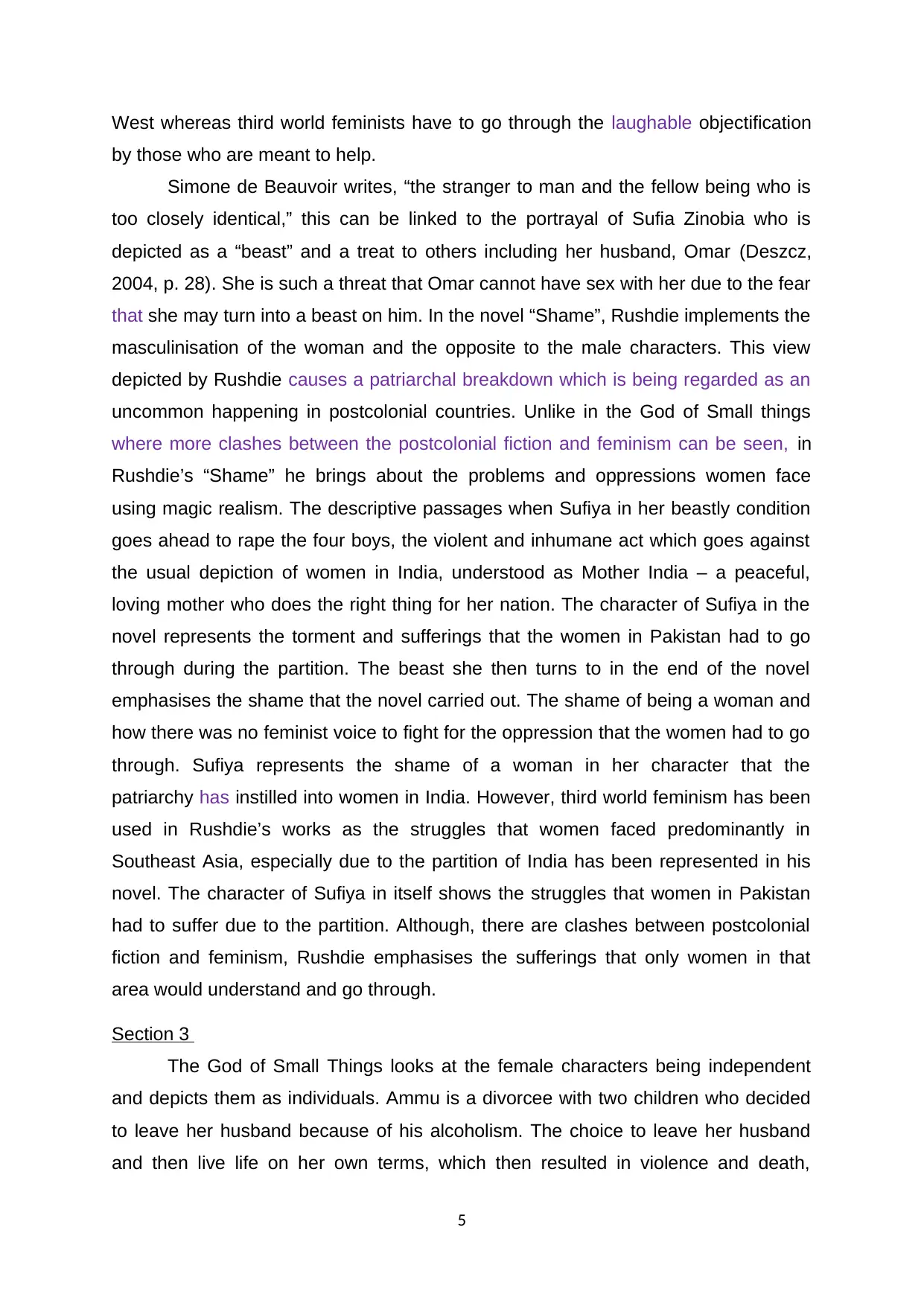
West whereas third world feminists have to go through the laughable objectification
by those who are meant to help.
Simone de Beauvoir writes, “the stranger to man and the fellow being who is
too closely identical,” this can be linked to the portrayal of Sufia Zinobia who is
depicted as a “beast” and a treat to others including her husband, Omar (Deszcz,
2004, p. 28). She is such a threat that Omar cannot have sex with her due to the fear
that she may turn into a beast on him. In the novel “Shame”, Rushdie implements the
masculinisation of the woman and the opposite to the male characters. This view
depicted by Rushdie causes a patriarchal breakdown which is being regarded as an
uncommon happening in postcolonial countries. Unlike in the God of Small things
where more clashes between the postcolonial fiction and feminism can be seen, in
Rushdie’s “Shame” he brings about the problems and oppressions women face
using magic realism. The descriptive passages when Sufiya in her beastly condition
goes ahead to rape the four boys, the violent and inhumane act which goes against
the usual depiction of women in India, understood as Mother India – a peaceful,
loving mother who does the right thing for her nation. The character of Sufiya in the
novel represents the torment and sufferings that the women in Pakistan had to go
through during the partition. The beast she then turns to in the end of the novel
emphasises the shame that the novel carried out. The shame of being a woman and
how there was no feminist voice to fight for the oppression that the women had to go
through. Sufiya represents the shame of a woman in her character that the
patriarchy has instilled into women in India. However, third world feminism has been
used in Rushdie’s works as the struggles that women faced predominantly in
Southeast Asia, especially due to the partition of India has been represented in his
novel. The character of Sufiya in itself shows the struggles that women in Pakistan
had to suffer due to the partition. Although, there are clashes between postcolonial
fiction and feminism, Rushdie emphasises the sufferings that only women in that
area would understand and go through.
Section 3
The God of Small Things looks at the female characters being independent
and depicts them as individuals. Ammu is a divorcee with two children who decided
to leave her husband because of his alcoholism. The choice to leave her husband
and then live life on her own terms, which then resulted in violence and death,
5
by those who are meant to help.
Simone de Beauvoir writes, “the stranger to man and the fellow being who is
too closely identical,” this can be linked to the portrayal of Sufia Zinobia who is
depicted as a “beast” and a treat to others including her husband, Omar (Deszcz,
2004, p. 28). She is such a threat that Omar cannot have sex with her due to the fear
that she may turn into a beast on him. In the novel “Shame”, Rushdie implements the
masculinisation of the woman and the opposite to the male characters. This view
depicted by Rushdie causes a patriarchal breakdown which is being regarded as an
uncommon happening in postcolonial countries. Unlike in the God of Small things
where more clashes between the postcolonial fiction and feminism can be seen, in
Rushdie’s “Shame” he brings about the problems and oppressions women face
using magic realism. The descriptive passages when Sufiya in her beastly condition
goes ahead to rape the four boys, the violent and inhumane act which goes against
the usual depiction of women in India, understood as Mother India – a peaceful,
loving mother who does the right thing for her nation. The character of Sufiya in the
novel represents the torment and sufferings that the women in Pakistan had to go
through during the partition. The beast she then turns to in the end of the novel
emphasises the shame that the novel carried out. The shame of being a woman and
how there was no feminist voice to fight for the oppression that the women had to go
through. Sufiya represents the shame of a woman in her character that the
patriarchy has instilled into women in India. However, third world feminism has been
used in Rushdie’s works as the struggles that women faced predominantly in
Southeast Asia, especially due to the partition of India has been represented in his
novel. The character of Sufiya in itself shows the struggles that women in Pakistan
had to suffer due to the partition. Although, there are clashes between postcolonial
fiction and feminism, Rushdie emphasises the sufferings that only women in that
area would understand and go through.
Section 3
The God of Small Things looks at the female characters being independent
and depicts them as individuals. Ammu is a divorcee with two children who decided
to leave her husband because of his alcoholism. The choice to leave her husband
and then live life on her own terms, which then resulted in violence and death,
5
⊘ This is a preview!⊘
Do you want full access?
Subscribe today to unlock all pages.

Trusted by 1+ million students worldwide
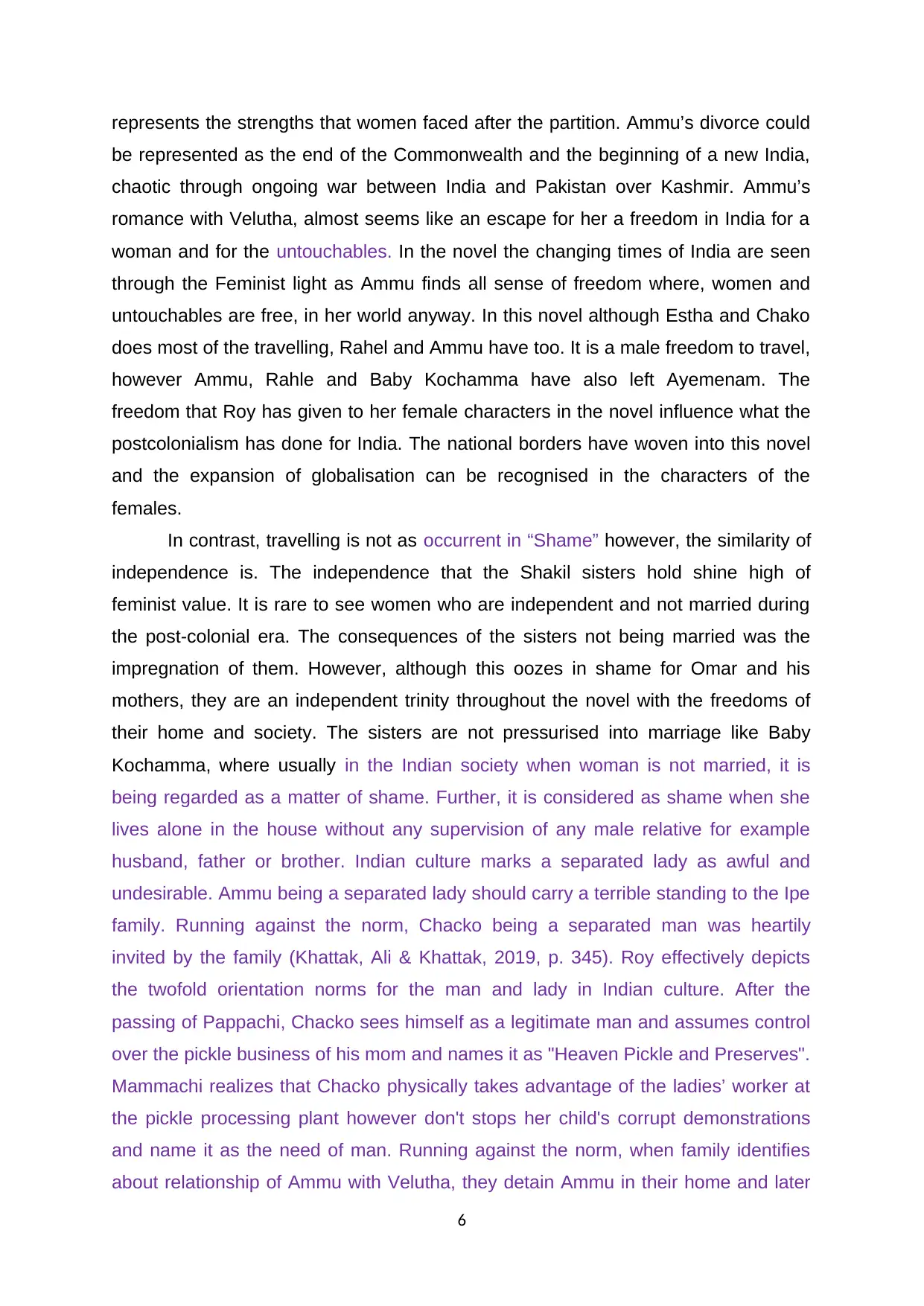
represents the strengths that women faced after the partition. Ammu’s divorce could
be represented as the end of the Commonwealth and the beginning of a new India,
chaotic through ongoing war between India and Pakistan over Kashmir. Ammu’s
romance with Velutha, almost seems like an escape for her a freedom in India for a
woman and for the untouchables. In the novel the changing times of India are seen
through the Feminist light as Ammu finds all sense of freedom where, women and
untouchables are free, in her world anyway. In this novel although Estha and Chako
does most of the travelling, Rahel and Ammu have too. It is a male freedom to travel,
however Ammu, Rahle and Baby Kochamma have also left Ayemenam. The
freedom that Roy has given to her female characters in the novel influence what the
postcolonialism has done for India. The national borders have woven into this novel
and the expansion of globalisation can be recognised in the characters of the
females.
In contrast, travelling is not as occurrent in “Shame” however, the similarity of
independence is. The independence that the Shakil sisters hold shine high of
feminist value. It is rare to see women who are independent and not married during
the post-colonial era. The consequences of the sisters not being married was the
impregnation of them. However, although this oozes in shame for Omar and his
mothers, they are an independent trinity throughout the novel with the freedoms of
their home and society. The sisters are not pressurised into marriage like Baby
Kochamma, where usually in the Indian society when woman is not married, it is
being regarded as a matter of shame. Further, it is considered as shame when she
lives alone in the house without any supervision of any male relative for example
husband, father or brother. Indian culture marks a separated lady as awful and
undesirable. Ammu being a separated lady should carry a terrible standing to the Ipe
family. Running against the norm, Chacko being a separated man was heartily
invited by the family (Khattak, Ali & Khattak, 2019, p. 345). Roy effectively depicts
the twofold orientation norms for the man and lady in Indian culture. After the
passing of Pappachi, Chacko sees himself as a legitimate man and assumes control
over the pickle business of his mom and names it as "Heaven Pickle and Preserves".
Mammachi realizes that Chacko physically takes advantage of the ladies’ worker at
the pickle processing plant however don't stops her child's corrupt demonstrations
and name it as the need of man. Running against the norm, when family identifies
about relationship of Ammu with Velutha, they detain Ammu in their home and later
6
be represented as the end of the Commonwealth and the beginning of a new India,
chaotic through ongoing war between India and Pakistan over Kashmir. Ammu’s
romance with Velutha, almost seems like an escape for her a freedom in India for a
woman and for the untouchables. In the novel the changing times of India are seen
through the Feminist light as Ammu finds all sense of freedom where, women and
untouchables are free, in her world anyway. In this novel although Estha and Chako
does most of the travelling, Rahel and Ammu have too. It is a male freedom to travel,
however Ammu, Rahle and Baby Kochamma have also left Ayemenam. The
freedom that Roy has given to her female characters in the novel influence what the
postcolonialism has done for India. The national borders have woven into this novel
and the expansion of globalisation can be recognised in the characters of the
females.
In contrast, travelling is not as occurrent in “Shame” however, the similarity of
independence is. The independence that the Shakil sisters hold shine high of
feminist value. It is rare to see women who are independent and not married during
the post-colonial era. The consequences of the sisters not being married was the
impregnation of them. However, although this oozes in shame for Omar and his
mothers, they are an independent trinity throughout the novel with the freedoms of
their home and society. The sisters are not pressurised into marriage like Baby
Kochamma, where usually in the Indian society when woman is not married, it is
being regarded as a matter of shame. Further, it is considered as shame when she
lives alone in the house without any supervision of any male relative for example
husband, father or brother. Indian culture marks a separated lady as awful and
undesirable. Ammu being a separated lady should carry a terrible standing to the Ipe
family. Running against the norm, Chacko being a separated man was heartily
invited by the family (Khattak, Ali & Khattak, 2019, p. 345). Roy effectively depicts
the twofold orientation norms for the man and lady in Indian culture. After the
passing of Pappachi, Chacko sees himself as a legitimate man and assumes control
over the pickle business of his mom and names it as "Heaven Pickle and Preserves".
Mammachi realizes that Chacko physically takes advantage of the ladies’ worker at
the pickle processing plant however don't stops her child's corrupt demonstrations
and name it as the need of man. Running against the norm, when family identifies
about relationship of Ammu with Velutha, they detain Ammu in their home and later
6
Paraphrase This Document
Need a fresh take? Get an instant paraphrase of this document with our AI Paraphraser
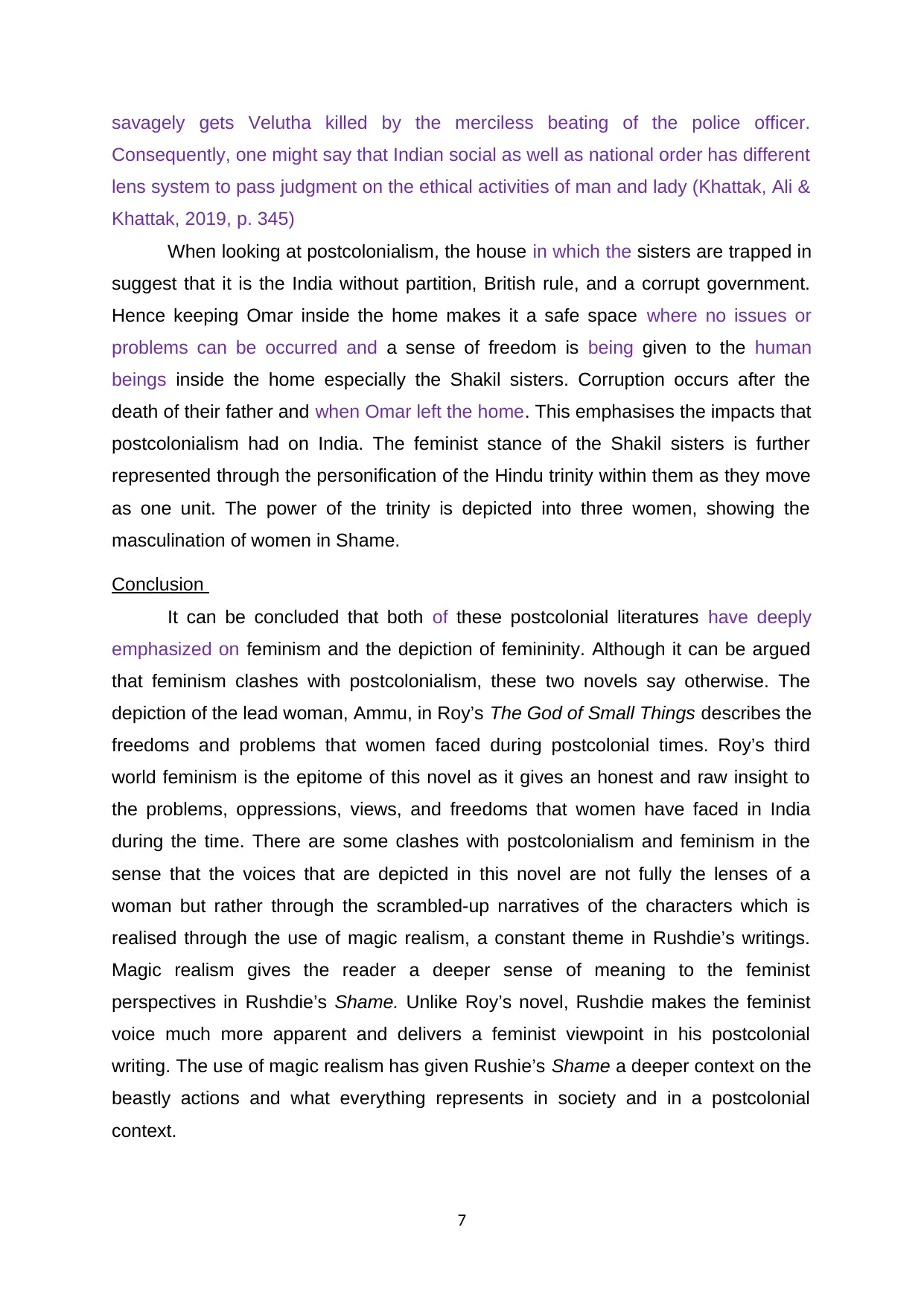
savagely gets Velutha killed by the merciless beating of the police officer.
Consequently, one might say that Indian social as well as national order has different
lens system to pass judgment on the ethical activities of man and lady (Khattak, Ali &
Khattak, 2019, p. 345)
When looking at postcolonialism, the house in which the sisters are trapped in
suggest that it is the India without partition, British rule, and a corrupt government.
Hence keeping Omar inside the home makes it a safe space where no issues or
problems can be occurred and a sense of freedom is being given to the human
beings inside the home especially the Shakil sisters. Corruption occurs after the
death of their father and when Omar left the home. This emphasises the impacts that
postcolonialism had on India. The feminist stance of the Shakil sisters is further
represented through the personification of the Hindu trinity within them as they move
as one unit. The power of the trinity is depicted into three women, showing the
masculination of women in Shame.
Conclusion
It can be concluded that both of these postcolonial literatures have deeply
emphasized on feminism and the depiction of femininity. Although it can be argued
that feminism clashes with postcolonialism, these two novels say otherwise. The
depiction of the lead woman, Ammu, in Roy’s The God of Small Things describes the
freedoms and problems that women faced during postcolonial times. Roy’s third
world feminism is the epitome of this novel as it gives an honest and raw insight to
the problems, oppressions, views, and freedoms that women have faced in India
during the time. There are some clashes with postcolonialism and feminism in the
sense that the voices that are depicted in this novel are not fully the lenses of a
woman but rather through the scrambled-up narratives of the characters which is
realised through the use of magic realism, a constant theme in Rushdie’s writings.
Magic realism gives the reader a deeper sense of meaning to the feminist
perspectives in Rushdie’s Shame. Unlike Roy’s novel, Rushdie makes the feminist
voice much more apparent and delivers a feminist viewpoint in his postcolonial
writing. The use of magic realism has given Rushie’s Shame a deeper context on the
beastly actions and what everything represents in society and in a postcolonial
context.
7
Consequently, one might say that Indian social as well as national order has different
lens system to pass judgment on the ethical activities of man and lady (Khattak, Ali &
Khattak, 2019, p. 345)
When looking at postcolonialism, the house in which the sisters are trapped in
suggest that it is the India without partition, British rule, and a corrupt government.
Hence keeping Omar inside the home makes it a safe space where no issues or
problems can be occurred and a sense of freedom is being given to the human
beings inside the home especially the Shakil sisters. Corruption occurs after the
death of their father and when Omar left the home. This emphasises the impacts that
postcolonialism had on India. The feminist stance of the Shakil sisters is further
represented through the personification of the Hindu trinity within them as they move
as one unit. The power of the trinity is depicted into three women, showing the
masculination of women in Shame.
Conclusion
It can be concluded that both of these postcolonial literatures have deeply
emphasized on feminism and the depiction of femininity. Although it can be argued
that feminism clashes with postcolonialism, these two novels say otherwise. The
depiction of the lead woman, Ammu, in Roy’s The God of Small Things describes the
freedoms and problems that women faced during postcolonial times. Roy’s third
world feminism is the epitome of this novel as it gives an honest and raw insight to
the problems, oppressions, views, and freedoms that women have faced in India
during the time. There are some clashes with postcolonialism and feminism in the
sense that the voices that are depicted in this novel are not fully the lenses of a
woman but rather through the scrambled-up narratives of the characters which is
realised through the use of magic realism, a constant theme in Rushdie’s writings.
Magic realism gives the reader a deeper sense of meaning to the feminist
perspectives in Rushdie’s Shame. Unlike Roy’s novel, Rushdie makes the feminist
voice much more apparent and delivers a feminist viewpoint in his postcolonial
writing. The use of magic realism has given Rushie’s Shame a deeper context on the
beastly actions and what everything represents in society and in a postcolonial
context.
7
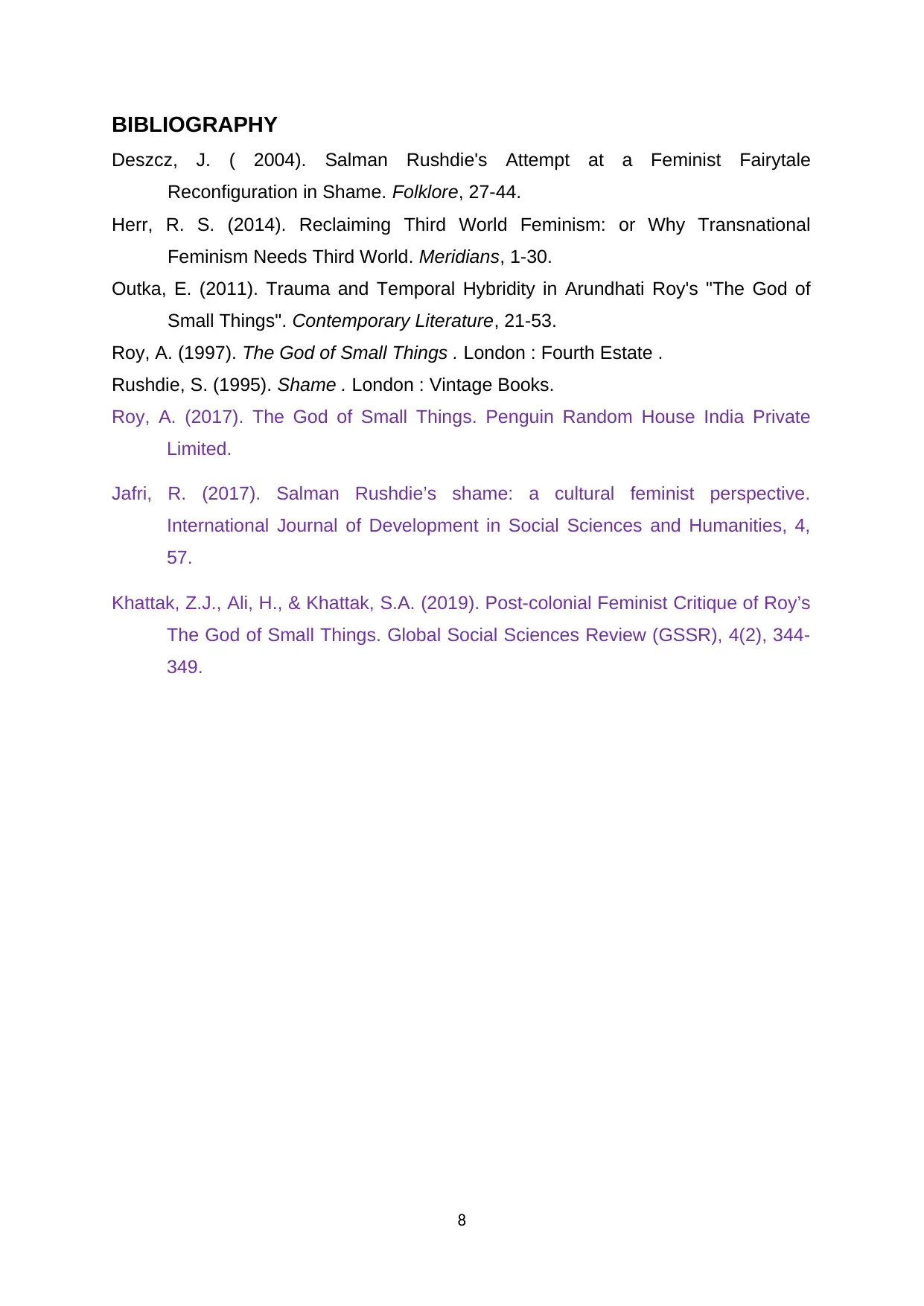
BIBLIOGRAPHY
Deszcz, J. ( 2004). Salman Rushdie's Attempt at a Feminist Fairytale
Reconfiguration in Shame. Folklore, 27-44.
Herr, R. S. (2014). Reclaiming Third World Feminism: or Why Transnational
Feminism Needs Third World. Meridians, 1-30.
Outka, E. (2011). Trauma and Temporal Hybridity in Arundhati Roy's "The God of
Small Things". Contemporary Literature, 21-53.
Roy, A. (1997). The God of Small Things . London : Fourth Estate .
Rushdie, S. (1995). Shame . London : Vintage Books.
Roy, A. (2017). The God of Small Things. Penguin Random House India Private
Limited.
Jafri, R. (2017). Salman Rushdie’s shame: a cultural feminist perspective.
International Journal of Development in Social Sciences and Humanities, 4,
57.
Khattak, Z.J., Ali, H., & Khattak, S.A. (2019). Post-colonial Feminist Critique of Roy’s
The God of Small Things. Global Social Sciences Review (GSSR), 4(2), 344-
349.
8
Deszcz, J. ( 2004). Salman Rushdie's Attempt at a Feminist Fairytale
Reconfiguration in Shame. Folklore, 27-44.
Herr, R. S. (2014). Reclaiming Third World Feminism: or Why Transnational
Feminism Needs Third World. Meridians, 1-30.
Outka, E. (2011). Trauma and Temporal Hybridity in Arundhati Roy's "The God of
Small Things". Contemporary Literature, 21-53.
Roy, A. (1997). The God of Small Things . London : Fourth Estate .
Rushdie, S. (1995). Shame . London : Vintage Books.
Roy, A. (2017). The God of Small Things. Penguin Random House India Private
Limited.
Jafri, R. (2017). Salman Rushdie’s shame: a cultural feminist perspective.
International Journal of Development in Social Sciences and Humanities, 4,
57.
Khattak, Z.J., Ali, H., & Khattak, S.A. (2019). Post-colonial Feminist Critique of Roy’s
The God of Small Things. Global Social Sciences Review (GSSR), 4(2), 344-
349.
8
⊘ This is a preview!⊘
Do you want full access?
Subscribe today to unlock all pages.

Trusted by 1+ million students worldwide
1 out of 9
Your All-in-One AI-Powered Toolkit for Academic Success.
+13062052269
info@desklib.com
Available 24*7 on WhatsApp / Email
![[object Object]](/_next/static/media/star-bottom.7253800d.svg)
Unlock your academic potential
Copyright © 2020–2026 A2Z Services. All Rights Reserved. Developed and managed by ZUCOL.
